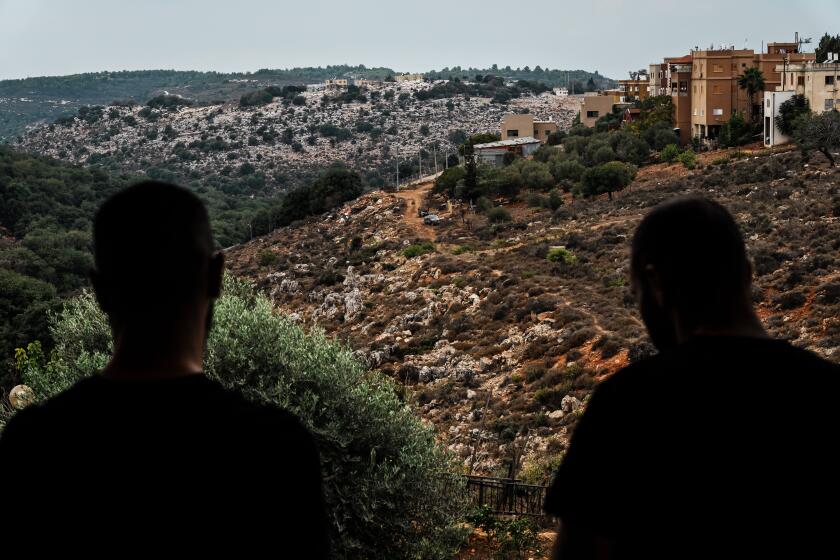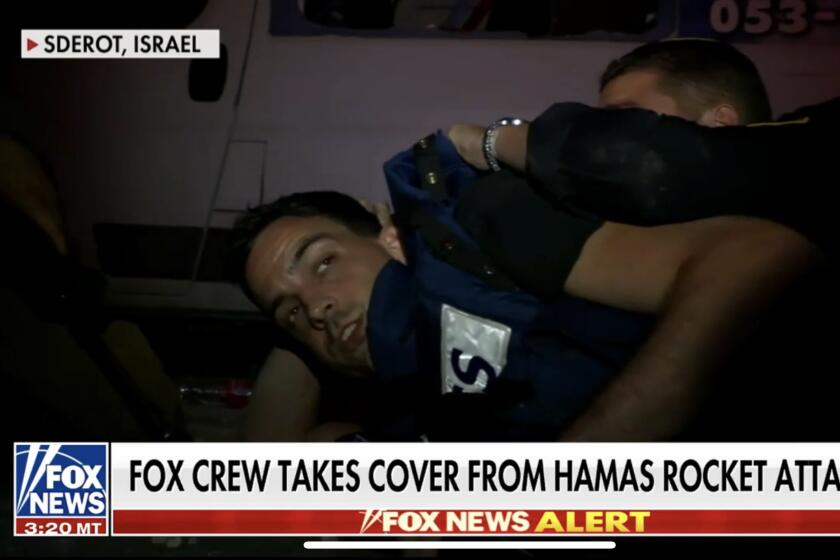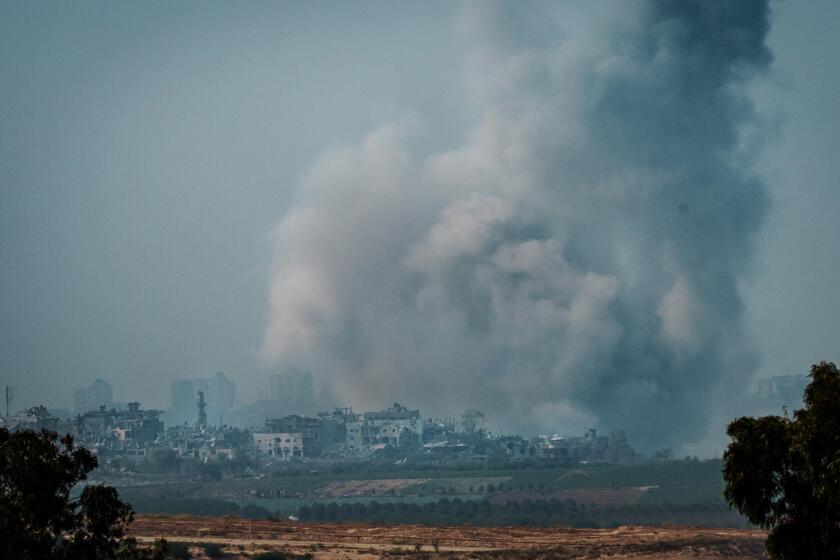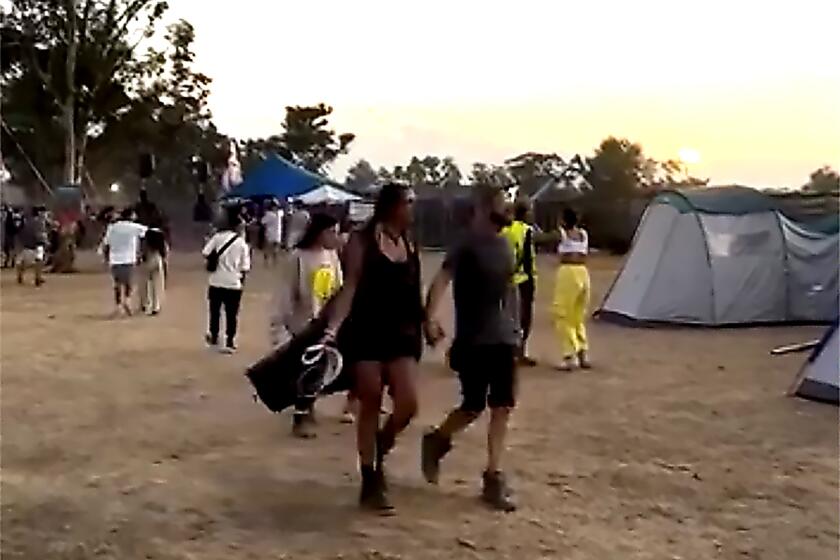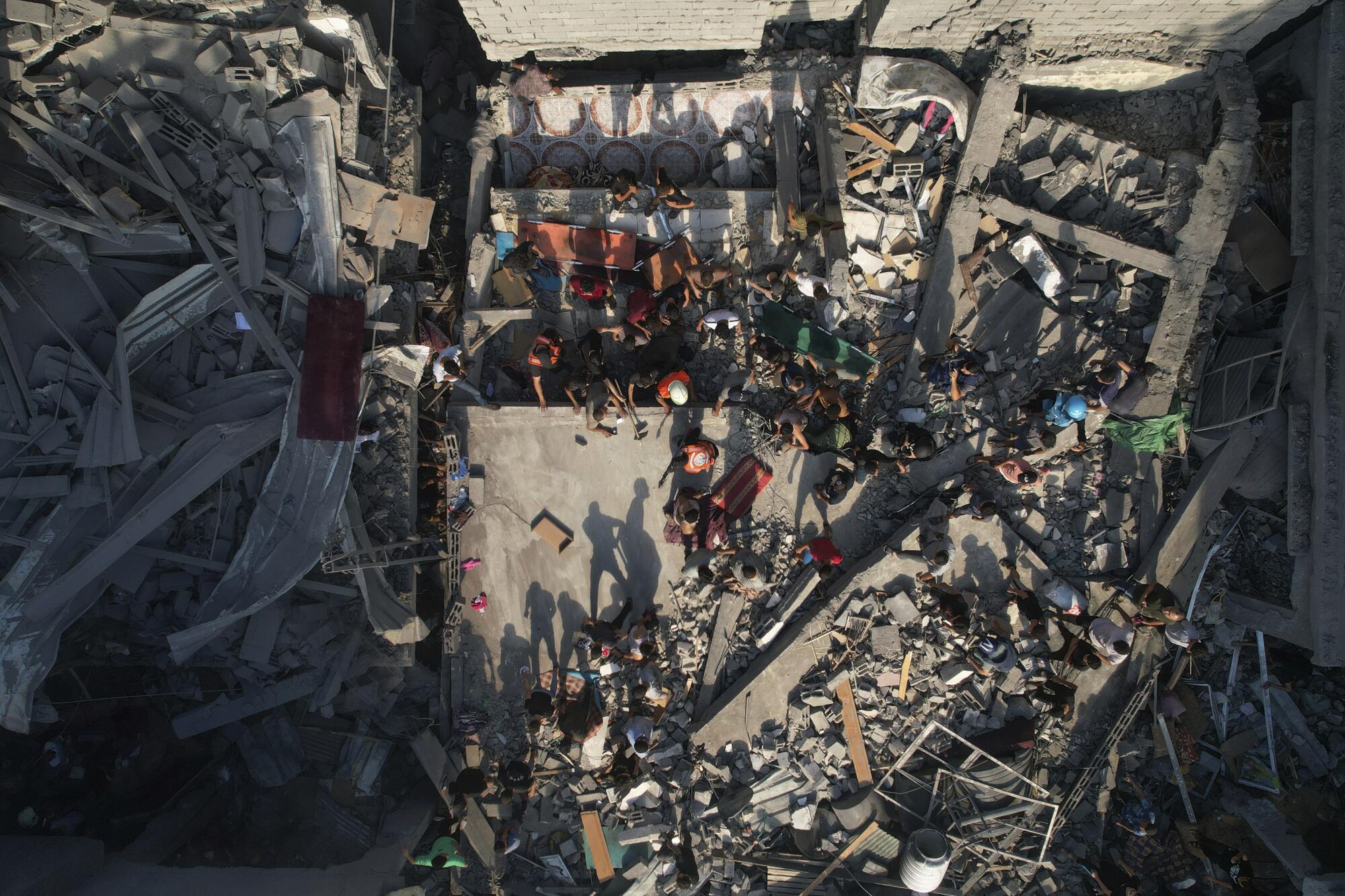
- Share via
JERUSALEM — Israel’s military directed the evacuation Friday of all of the hundreds of thousands of civilians living in Gaza City.
The order comes after Hamas militants and the United Nations said Israel has warned it wants the evacuation of all 1.1 million people from the northern part of the Gaza Strip.
The directives, announced on the seventh day of the war after a deadly Hamas assault on Israel, directs residents of Gaza City to flee deeper south into the Gaza Strip, a narrow coastal territory. Israel’s directive charged that Hamas militants were hiding in tunnels under the city.
“This evacuation is for your own safety,” the Israeli military said in a warning it said was sent to Gaza City civilians.
The flurry of directives could signal an impending ground offensive, though the Israeli military has not confirmed such an appeal. On Thursday it said that, while it was preparing, no decision has been made.
Israel delivered an even broader evacuation order — giving almost half of tiny Gaza’s population 24 hours to flee to the territory’s south — to the U.N. shortly before midnight, spokesman Stéphane Dujarric said. The Israeli military did not immediately confirm the broader evacuation order.
The broad evacuation order for all of Gaza’s north also applies to all U.N. staff and to the hundreds of thousands who have taken shelter in U.N. schools and other facilities since Israel launched round-the-clock airstrikes Saturday.
“The United Nations considers it impossible for such a movement to take place without devastating humanitarian consequences,” Dujarric said.
One U.N. official said the world body is trying to get clarity from senior Israeli officials.
“It’s completely unprecedented,” the official said, speaking on condition of anonymity because he was not authorized to speak publicly.
Panicked rumors of an evacuation had begun to spread in northern Gaza in the early morning Friday.
A ground offensive in Gaza, whose residents are densely packed into a sliver of land only 25 miles long, would probably bring even higher casualties on both sides in brutal house-to-house fighting. Lt. Col. Richard Hecht, an Israeli military spokesman, told reporters Thursday that forces “are preparing for a ground maneuver” should political leaders order one.
On Thursday, the Israeli military pulverized Gaza with airstrikes and said that its complete siege — which has left Palestinians desperate for food, fuel and medicine — would remain in place until the Hamas militants who rule the territory freed some 150 hostages taken during the grisly weekend cross-border rampage.
A visit by U.S. Secretary of State Antony J. Blinken, along with shipments of U.S. weapons, provides a powerful green light to Israel to drive ahead with its retaliation in Gaza after Hamas’ deadly attack on civilians and soldiers, even as international aid groups warned of a worsening humanitarian crisis.
Israel has halted deliveries of basic necessities and electricity to Gaza’s 2.3 million people and prevented entry of supplies from Egypt.
“Not a single electricity switch will be flipped on, not a single faucet will be turned on, and not a single fuel truck will enter until the Israeli hostages are returned home,” Israeli Energy Minister Israel Katz said on social media.
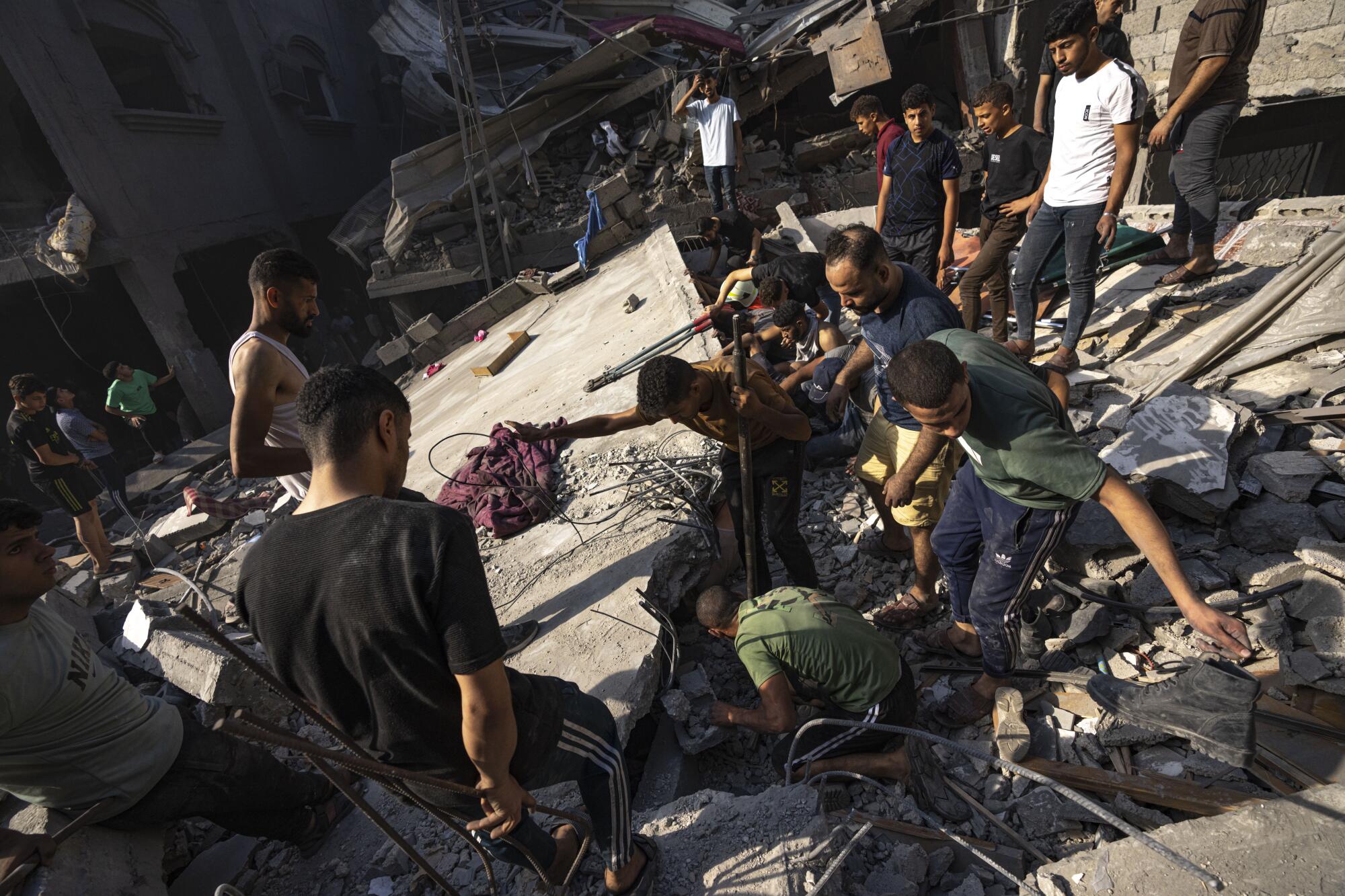
Hamas’ assault Saturday killed more than 1,300 people in Israel, including children and hundreds attending a music festival — a toll unseen in Israel for decades. The ensuing Israeli bombardment has killed more than 1,500 people in Gaza, according to authorities on both sides. Israel says that about 1,500 Hamas militants were killed inside Israel and that hundreds of the dead in Gaza are Hamas members. Thousands have been wounded on both sides.
On Israel’s border with Lebanon, residents are worried that groups like Hezbollah will join a war that eventually spirals into a regionwide conflict.
As Israel pounds Gaza, Hamas fighters have fired thousands of rockets into Israel since their weekend assault.
Amid concerns that the fighting could spread in the region, Syrian state media reported that Israeli airstrikes Thursday put two Syrian international airports out of service.
A strike Thursday afternoon on Gaza’s Jabaliya refugee camp collapsed a residential building on families sheltering inside, killing at least 45 people, Gaza’s Interior Ministry said. At least 23 of the dead were younger than 18, including a month-old infant, according to a list of the casualties. Ministry spokesman Eyad Bozum said that dozens were wounded and that the death toll was likely to rise as rescue workers were still pulling bodies from the rubble.
The home, belonging to the Shihab family, was packed with relatives who had fled bombing in other areas. Neighbors said a second house was hit at the same time, but the toll was not immediately known. The Israeli military did not immediately respond to a request for comment on the strike.
The Jabaliya camp has seen nonstop bombardment for days, said one neighbor, Khalil Abu Yahia.
“We can’t flee because anywhere you go you are bombed,” Abu Yahia said. “You need a miracle to survive here.”
The number of people who had fled their homes in Gaza reached 423,000 by Wednesday night — about 18% of the population of 2.3 million — the United Nations said. Most crowded into U.N.-run schools, while others are staying with relatives or even strangers.
The Israel-Hamas war is testing news media struggling with how to present the heinous casualties, combat misinformation on social media and face criticisms of bias.
Families were cutting down to one meal a day to conserve supplies, said Rami Swailem, a 34-year-old lecturer at Al-Azhar University, who has 32 members of his family sheltering in his home. Water stopped coming to the building two days ago, and they were rationing what’s left in the tank on the roof.
Alaa Younis Abuel-Omrain has been staying in a U.N. school after a strike on her home killed eight members of her family — her mother, aunt, a sister, a brother and his wife and their three children. She said food supplies were running out. Most bakeries stopped producing bread for lack of electricity.
“Even if there is food in some areas, we can’t get to it because of strikes,” she said.
On Wednesday, Gaza’s only power station ran out of fuel and shut down, leaving only lights powered by scattered private generators.
Hospitals, overwhelmed by a constant stream of wounded and running out of supplies, have only a few days’ worth of fuel before their power cuts off, aid officials say. The cutoff has also caused dire water shortages for more than 650,000 people, according to the U.N.
“Without electricity, hospitals risk turning into morgues,” said Fabrizio Carboni, regional director of the International Committee of the Red Cross. Newborn incubators, kidney dialysis machines, X-rays and more are all dependent on power, he said.
Ambulance crews carrying bodies from the rubble of demolished buildings to the morgue at Gaza’s biggest hospital, Shifa, found no space left. Dozens of bodies in body bags were lined up in the hospital parking lot. Fourteen health facilities have been damaged in strikes, health officials said Thursday.
With Israel sealing off the territory, the only way in or out is through the crossing with Egypt at Rafah. Egypt’s Foreign Ministry said it has not officially closed Rafah but airstrikes have prevented it from operating. Egypt has been trying to convince Israel and the United States to allow the delivery of aid and fuel through Rafah.
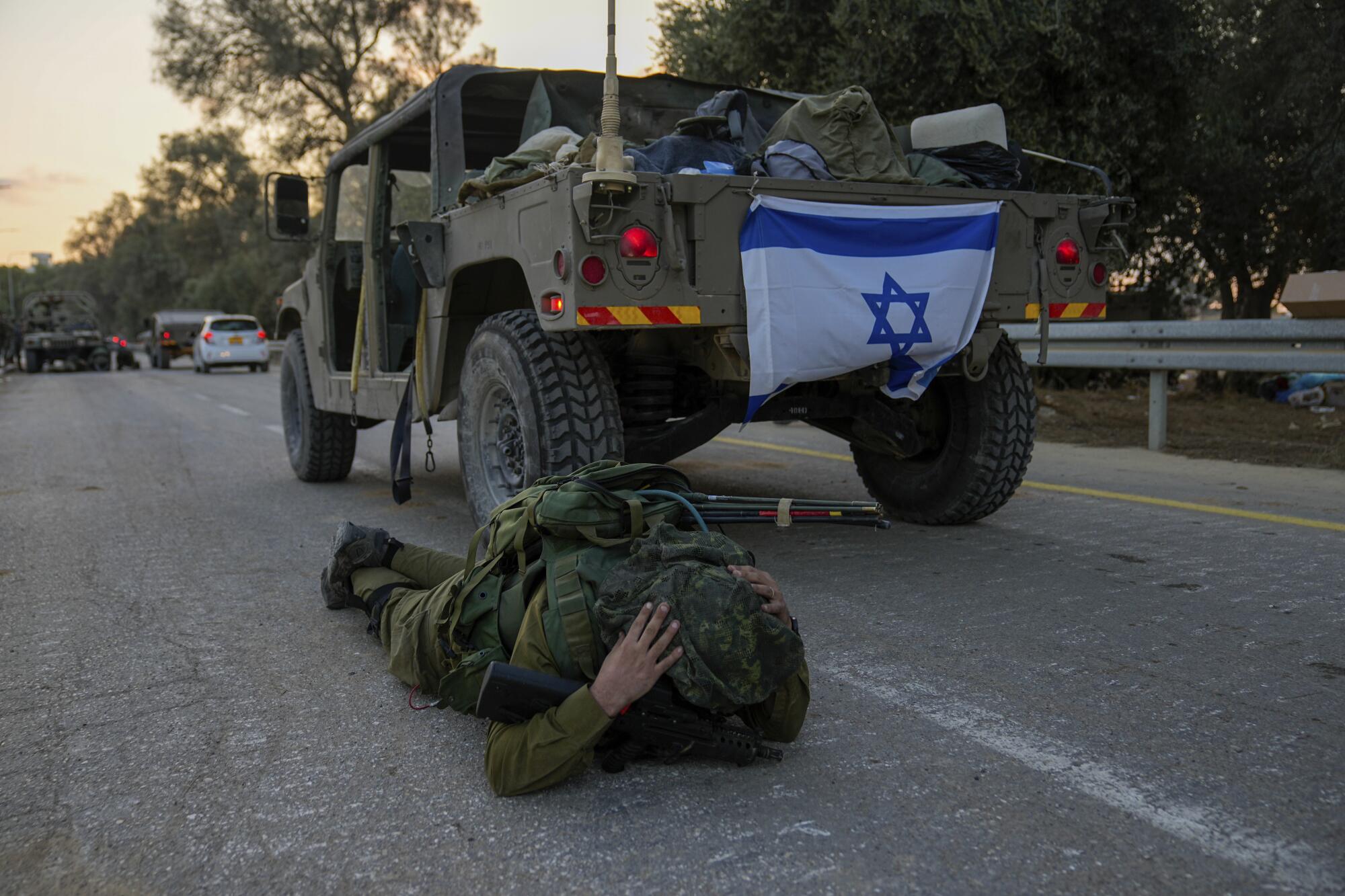
Israel is employing a new tactic of leveling whole neighborhoods, rather than just individual buildings. Hecht said that targeting decisions were based on intelligence and that civilians were warned.
“Right now, we are focused on taking out their senior leadership,” Hecht said. The military said strikes have hit Hamas’ elite Nukhba forces, including command centers used by the fighters in Saturday’s attack, and the home of a senior Hamas naval operative used to store weapons.
Even with the warnings, Palestinians say that some are unable to escape or have nowhere to go and that entire families have been crushed under rubble.
Sometimes, the strikes come with no notice, survivors say.
“There was no warning or anything,” said Hashem Abu Manea, 58, who lost his 15-year-old daughter, Joanna, when a strike late Tuesday leveled his home in Gaza City.
Israeli Prime Minister Benjamin Netanyahu has vowed to “crush and destroy” Hamas, which has controlled Gaza since 2007. Netanyahu has alleged Hamas atrocities, including the killing of children in their homes, beheading soldiers and raping women. His allegations could not be independently confirmed.
Amid grief and demands for vengeance among the Israeli public, the government is under intense public pressure to topple the militant group rather than continuing to try to bottle it up in Gaza.
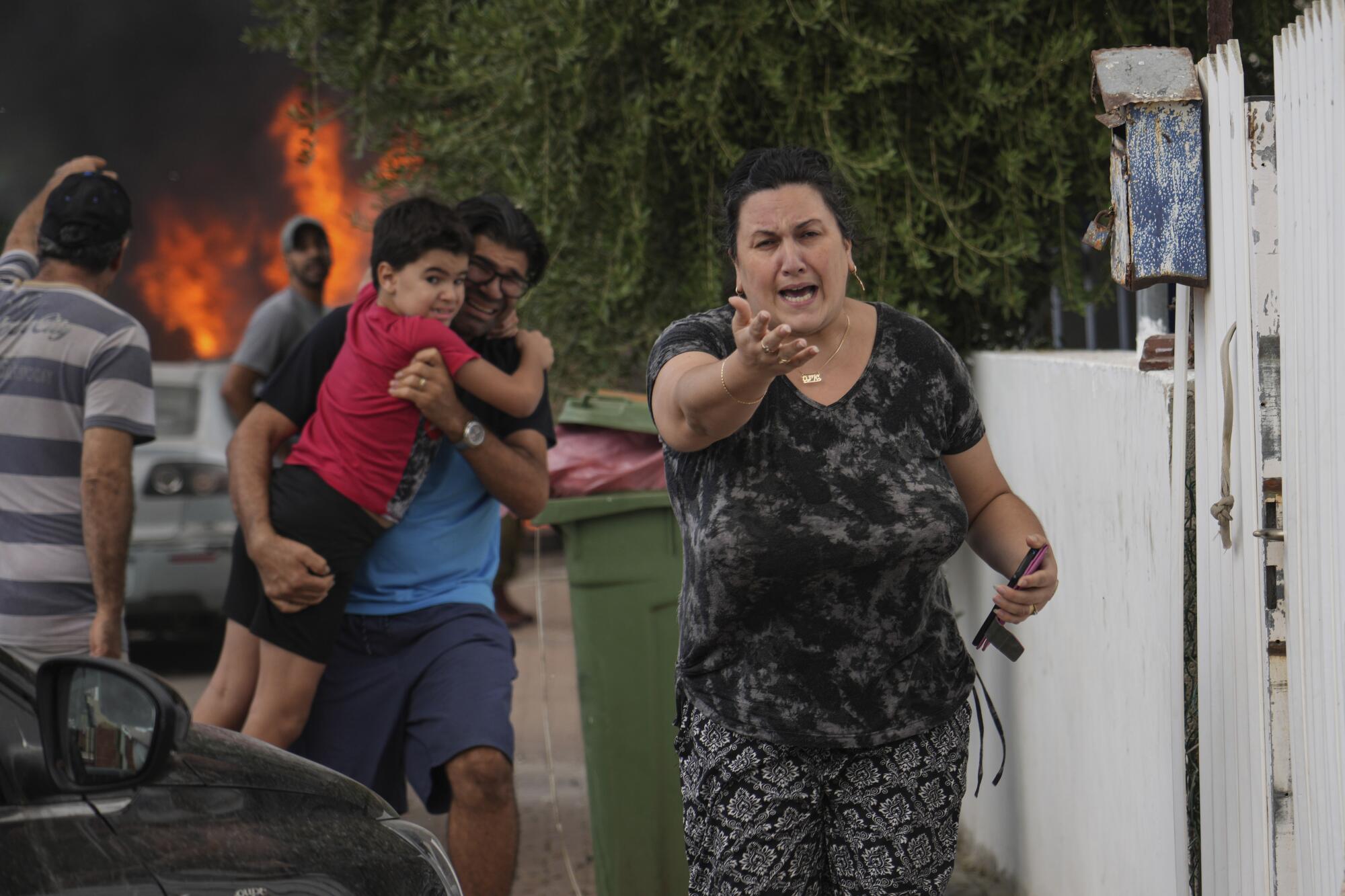
In a video released Thursday, civilian Hamas members defended the group’s rampage and decried the civilian deaths in Gaza from six days of Israeli airstrikes. The solemn video lacked the bravado of a recording aired Saturday by Hamas’ military wing that hailed “the greatest battle” as the massacres were still taking place.
Basem Naim, a former Hamas government minister, said that in the “swift collapse” of the Israeli military on Saturday, “chaos prevailed and civilians found themselves in the middle of the confrontation.” The claim is contradicted by countless videos and survivor accounts of Hamas militants deliberately targeting and killing civilians in Israel.
Naim added that there would be no action to free the 150 Israeli captives taken back into Gaza while Israel’s operation continued.
In Gaza, mourners buried families together in shrouds. At one funeral, they placed the battered body of a little girl in the arms of her slain father.
Israel too was in mourning. At a funeral for a 25-year-old woman killed with at least 260 other people at a desert music festival, and at another service for a slain Israeli soldier, mourners sat cross-legged on the ground next to caskets, wailing or quietly weeping.
The Israeli military said in a statement on Saturday night that it was preparing a coordinated offensive in Gaza using air, ground and naval forces.
Brewing anger over Israeli military and intelligence failures in the surprise attack is being directed at Netanyahu’s far-right government, which for months advanced a contentious legal overhaul that divided the country and affected the military.
In what appeared to be a first admission of fault from a government member, Israeli Education Minister Yoav Kisch told Israeli news outlet Ynet: “We are responsible. I, as a member of the government, am responsible. We were dealing with nonsense.”
Israel’s public diplomacy minister quit, the first fissure in Netanyahu’s government since the onslaught.
Israel has mobilized 360,000 reservists, massed additional forces near Gaza and evacuated tens of thousands of residents from nearby communities. A new war Cabinet, which includes a longtime opposition politician, was sworn in Thursday to direct the fight.
A high-ranking Hamas official, Saleh Arouri, warned Thursday that any Israeli invasion of Gaza “will turn into a disaster for its army,” saying the group was prepared to respond.
Blinken’s visit underscored American backing for Israel’s retaliation.
‘Every single Israeli friend of mine knows someone who was there, someone who was murdered,’ said one L.A. DJ. ‘No one deserved this.’
“You may be strong enough on your own to defend yourselves, but as long as America exists, you will never have to,” Blinken said after meeting with Netanyahu in Tel Aviv. “We will always be there by your side.”
He said he told Netanyahu that it was “so important to take every possible precaution to avoid harming civilians.”
Blinken will also meet Palestinian Authority President Mahmoud Abbas, whose faction rules parts of the occupied West Bank, and Jordan’s King Abdullah II. U.S. Defense Secretary Lloyd J. Austin III planned to visit Israel on Friday.
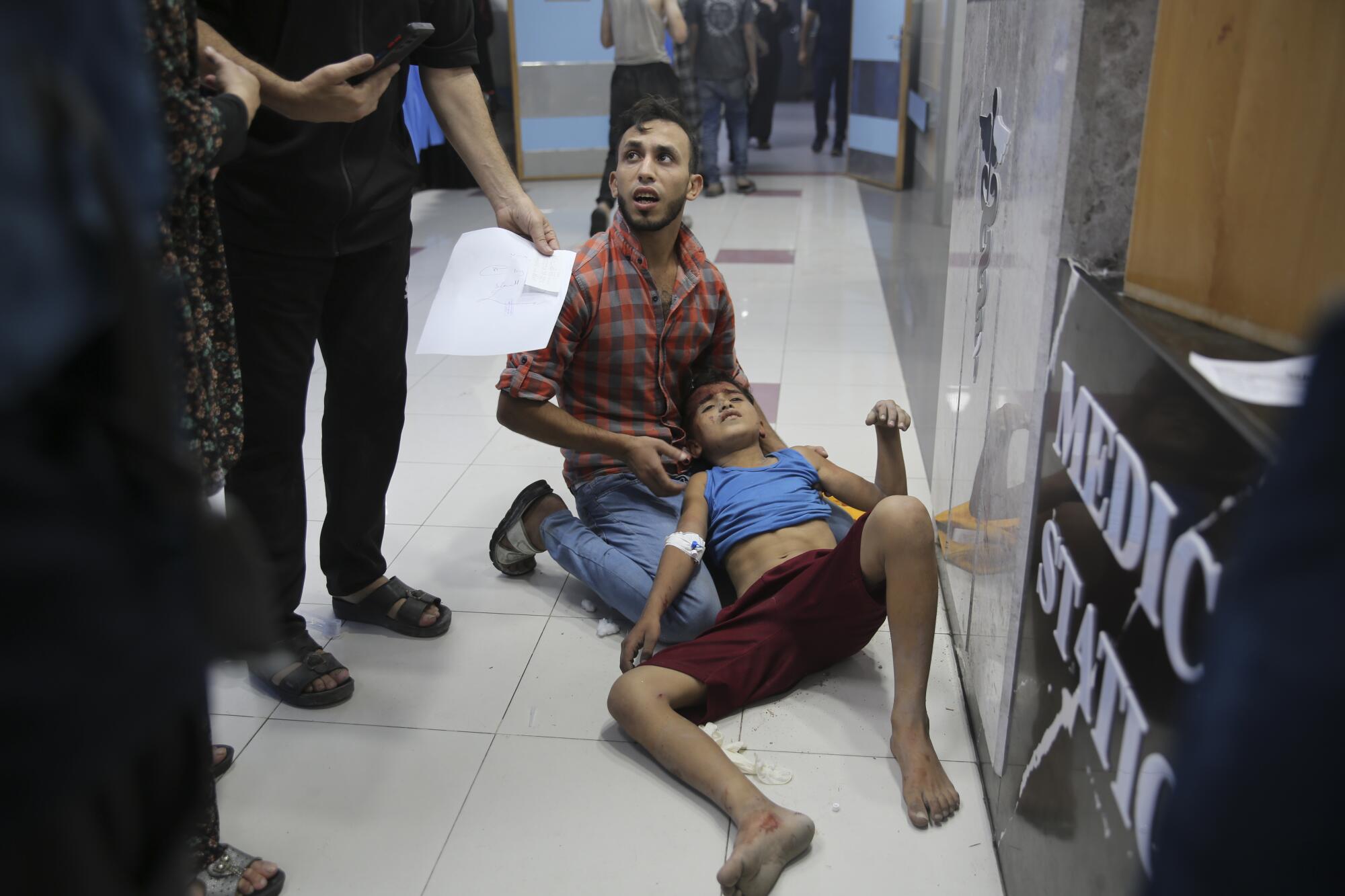
Meanwhile, the Palestinian Health Ministry said two Palestinians were killed in the occupied West Bank on Thursday when Israeli settlers sprayed bullets at a funeral for three people killed in a settler rampage the day before. Video showed Jewish settlers in their cars swerving into the funeral procession and cutting off the road before stopping and opening fire.
Breaking News
Get breaking news, investigations, analysis and more signature journalism from the Los Angeles Times in your inbox.
You may occasionally receive promotional content from the Los Angeles Times.
Armed Jewish settlers have rampaged through villages in the Israeli-occupied West Bank and hurled stones at passing Palestinian cars, residents say. The Palestinian Authority’s Health Ministry says 28 Palestinians have been killed in the West Bank and two in Israeli-annexed East Jerusalem since Saturday.
In other news, the U.S. and Qatar reached an agreement that resolved, for the time being, that the Qataris will not act on any request from Iran, the principal financial and military sponsor of Hamas, to access $6 billion in Iranian funds that were unblocked as part of an American prisoner swap last month, a U.S. official said Thursday.
The move, which stops short of a full refreezing of Iranian funds in Qatar’s banking system, follows the deadly attacks by Hamas on Israel and continued Republican criticism of the Biden administration’s deal with Iran, in which the money was unfrozen in exchange for the release of five detained Americans. The official who outlined the understanding between the U.S. and Qatar was not authorized to comment and spoke on condition of anonymity.
More to Read
Sign up for Essential California
The most important California stories and recommendations in your inbox every morning.
You may occasionally receive promotional content from the Los Angeles Times.
